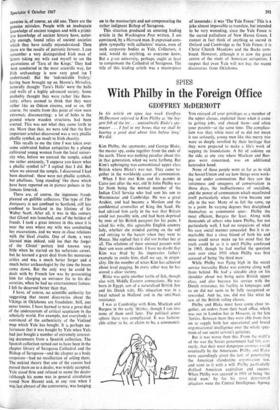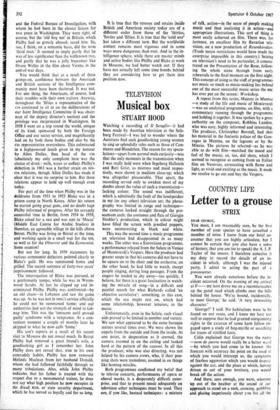With Philby in the Foreign Office
SPIES GEOFFREY McDERMOTT
In his article on spies last week Geoffrey McDermott referred to Kim Philby as the big- gest fish of the lot . . . undoubtedly Blake's spy- master . . . I feel in my bones that we shall be hearing a good deal about him before long.' We did.
Kim Philby, the spymaster, and George Blake, the master spy, came together from the ends of the earth. There was nothing peculiar about this in that generation, when we were farfiung. But Kim's upbringing was conventional upper class British where Blake's was not. They came to- gether in the worldwide cause of communism.
When I first met Kim and his parents in Cairo just after the war, old St John Philby was far from being the normal member of the Indian Civil Service who had sent his son to Westminster and Cambridge. He was a great Arabist, and had become a Moslem and the confidential counsellor of King ibn Saud. He had advised him early in the war that Britain could'not possibly win, and had been deprived by tato of his British passport for his pains. I asked.his wife, this agreeable English country lady whether she minded putting on the veil and retiring to the harem when they went to Mecca. She replied that it did.-not bother her at all. The relations of these unusual parents with their son were ambivalent. I have no doubt that Kim was fired by his impressive father's example to outdo him, shall we say, in origin- ality. On the number of wives Kim has achieved about level pegging. In every other way he has scored a clear victory.
Blake was quite another kettle of fish, though also with Middle Eastern connections. He was born in Egypt, son of a' naturalised British Jew and his Dutch wife. His education was in a local school in Holland and in the anti-Nazi . resistance.
I was at Cambridge with Kim, Maclean and Burgess in the early 'thirties, though I ran into none of them until later. The political atmo- sphere there was complicated. It was fashion- able either to be, or claim to be, a communist.
You enjoyed all your privileges as a member of the upper classes, exploited them when it came - to getting jobs, and abused them—and often your parents—at the same time. The complica- tion was that, while most of us did not mean it too seriously, young men like this merry trio were so deeply revolted by their heritage that they were prepared to make a life's work of sapping its foundations. A bit of sodomy on the side, at any rate where Maclean and Bur- gess were concerned, was an additional heterodox bond.
None of these people went so far as to visit the Soviet Union and see how things were work- ing out under communism. But they saw the rottenness and smugness of conservatism in those days, the ineffectiveness of socialism, and the power of communism which manifested itself particularly when the USSR became our ally in the war. Many of us felt the same, up to a point. In varying degrees they disciplined themselves as communist spies: Philby the most efficient, Burgess the least. Along with thousands of others who knew Philby, but not particularly well, I had no suspicions of what his easy social manner concealed. But 'it is re- markable that a close friend of both his and mine could never make up his mind that the truth could be as it is until Philby confessed in 1963, though he had mulled the question over ever since 1951 when Philby was first accused of being 'the third man.'
While Philby was flying high in the secret service hierarchy Blake was coming along well from behind. He had a sizeable chip on his shoulder about not being quite British upper class, and also because his service with the . Dutch resistance, his facility in languages and so on did not seem to be fully recognised or rewarded. And he, too, did not like what he saw of the British ruling classes.
Philby and Blake must have come close to- gether, on orders from their head office, which was not in London but in Moscow, in the late 'forties. Between them they were able from then on to supply both hot operational and broad organisational intelligence over the whole spec- trum of our secret service's activities.
But it was worse than this. From the midd'e of the war the Soviet government had felt, cor- rectly, that their most dangerous enemies would eventually be the Americans. Philby and Blake were accordingly given the task of penetrating the American clandestine organisation too, and went to it with a will. Philby particularly disliked American capitalism and success. When Philby was accused in 1951 of being 'the third man,' by far his most determined attackers were the Central Intelligence Agency
and the Federal Bureau of Investigation, with whom he had been in the closest liaison for two years in Washington. They were right, of course; but the 'old boy net' in Britain, which Philby had so grossly abused, saved him. So, too, I think, on a semantic basis, did the term 'third man.' It seemed to imply partly that he was of less significance than the wellknown two, and partly that he was a jolly buccaneer like Orson Welles in the film about Vienna in the end-of-war days.
You would think that as a result of these goings-on, confidence between the American and British sections of the Intelligence com- munity must have been shattered. It was not. For one thing, the Americans, of course, had their troubles with their own traitors. Anyway, throughout the 'fifties a representative of the CIA continued to sit in on the deliberations of our Joint Intelligence Committee (I was chair- man of the deputy director's section) and the privilege was reciprocated in Washington. In 1958 I went on a trip round the world, unique of its kind, sponsored by both the Foreign Office and our secret service, and magnificently laid on by both those bodies and also by the a* representative everywhere. This culminated in a highpowered lunch given in my honour by Allen Dulles, then head of the CIA (absolutely my only complaint here was the choice of drink : milk, water or coffee). Philby's defection in 1963 was a further strain on BIS- CIA relations, though Allen Dulles has made it clear that it was no surprise to him. But these relations appear to hold up well enough even today.
For part of the time when Philby was in the doldrums from 1951 to 1955 Blake was in a prison camp in North Korea. After his return he started going great guns, and no doubt kept Philby informed of progress. After his savagely successful time in Berlin, from 1954 to 1959, Blake asked for a rest and was sent to 'Mecas' (Middle East Centre for Arabic Studies) in Shemlan, an agreeable village in the hills above Beirut. Philby was living in Beirut at the time, and working again in a small way for the sts, as well as for the Observer and the Economist. Some reunion!
But not for long. In 1959 statements by various communist defectors pointed clearly to Blake's guilt. He was summoned home and grilled: The record sentence of forty-two years' imprisonment followed.
The interrogation of Blake was pursued, at a gentlemanly tempo, while he was in Worm- wood Scrubs. At last he slipped up and in- criminated Philby. Philby was confronted—by an old chum—in Lebanon and saw the game was up. As he was not in HMG'S service officially he could not be summoned home; and our authorities bad not the strength of mind to kid- nap him. This was the 'innocent until proved guilty' syndrome with a vengeance. At a con- venient moment a couple of months later he skipped to what he now calls 'home.'
His son's reports as a result of his recent visit to Moscow do not reveal much. In Beirut Philby had removed a great friend's wife, a goodlooking girl as I remember her. John Philby does not reveal that, true to his own comradely habits, Philby has now removed Melinda Maclean from her husband Donald, whom she had followed faithfully through so many tribulations. Also, while John Philby indicates that his father is treated with the respect due to a monumental traitor, he does not say what high position he now occupies in the dread KGB, or state security department, which he has served so loyally and for so long. It is true that the stresses and strains inside British and American society today are of a different order from those of the 'thirties, 'forties and 'fifties. It is true that the 'cold war' has taken a different turn. But the worldwide contest remains most vigorous and in some ways more dangerous than ever. And in the in- telligence sphere, while there are master minds and active bodies like Philby and Blake at work in Moscow, we had better watch out. If they have not actually left some time bombs behind they are considering how to get them into position now.



































 Previous page
Previous page